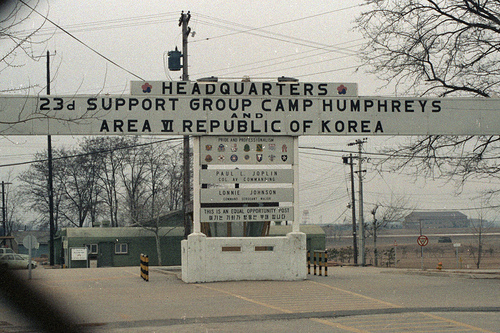More than 70 aging women live in a squalid neighborhood between the rear gate of the U.S. Army garrison here and half a dozen seedy nightclubs. Near the front gate, glossy illustrations posted in real-estate offices show the dream homes that may one day replace their one-room shacks.

They once worked as prostitutes for American soldiers in this “camptown” near Camp Humphreys, and they've stayed because they have nowhere else to go. Now, the women are being forced out of the Anjeong-ri neighborhood by developers and landlords eager to build on prime real estate around the soon-to-be-expanded garrison.
“My landlord wants me to leave, but my legs hurt, I can't walk, and South Korean real estate is too expensive,'' says Cho Myung-ja, 75, a former prostitute who receives monthly court eviction notices at her home, which she has rarely left over the last five years because of leg pain.
“I feel like I'm suffocating,'' she says.
Plagued by disease, poverty and stigma, the women have little to no support from the public or the government.
Their fate contrasts greatly with a group of Korean women forced into sexual slavery by Japanese troops during World War II. Those so-called “comfort women'' receive government assistance under a special law, and large crowds demanding that Japan compensate and apologize to the women attend weekly rallies outside the Japanese Embassy.
While the camptown women get social welfare, there's no similar law for special funds to help them, according to two Pyeongtaek city officials who refused to be named because of office rules. Many people in South Korea don't even know about the camptown women.
In the decades following the devastation of the 1950-53 Korean War, South Korea was a poor dictatorship deeply dependent on the U.S. military. Analysts say the South Korean government saw the women as necessary for the thousands of U.S. soldiers stationed in the South. Some of the women went to the camps voluntarily; others were brought by pimps.
In 1962, the government formalized the camptowns as "special tourism districts'' with legalized prostitution. That year, some 20,000 registered prostitutes worked in nearly 100 camptowns, and many more were unregistered.
The women who became prostitutes saw few other options, but the work made them social pariahs, unable to live or work anywhere else, says Park Kyung-soo, secretary general of the National Campaign for the Eradication of Crimes against Korean Civilians, a group that tries to uncover and monitor alleged U.S. military crimes against South Koreans.
Pockets of former camptown women exist throughout South Korea. Now in their 60s, 70s and 80s, the women of Anjeong-ri mostly live alone in tiny homes, struggling to pay for food and rent on a monthly government stipend of 300,000 to 400,000 won ($300 to $400).
Activists say most of the women are in danger of losing their homes.
“I'm so worried that I can't sleep,” says a camptown woman who will only give her surname, Kim, because she's ashamed of her past. The 75-year-old's landlords have told her she has a month to leave, and she looks nearly every day for a new home.
The camptown women's predicament began when Washington and Seoul agreed in 2004 to relocate the sprawling Yongsan U.S. base, which takes up 620 acres of prime real estate in the center of wealthy Seoul, to the base in Pyeongtaek, 70 kilometers (45 miles) from the capital. The deadline, originally set for 2012, is now tentatively 2016.
(AP)











![[From the Scene] Monks, Buddhists hail return of remains of Buddhas](http://res.heraldm.com/phpwas/restmb_idxmake.php?idx=644&simg=/content/image/2024/04/19/20240419050617_0.jpg&u=20240419175937)


![[From the Scene] Monks, Buddhists hail return of remains of Buddhas](http://res.heraldm.com/phpwas/restmb_idxmake.php?idx=652&simg=/content/image/2024/04/19/20240419050617_0.jpg&u=20240419175937)

![[KH Explains] Hyundai's full hybrid edge to pay off amid slow transition to pure EVs](http://res.heraldm.com/phpwas/restmb_idxmake.php?idx=652&simg=/content/image/2024/04/18/20240418050645_0.jpg&u=20240419100350)

![[Today’s K-pop] Illit drops debut single remix](http://res.heraldm.com/phpwas/restmb_idxmake.php?idx=642&simg=/content/image/2024/04/19/20240419050612_0.jpg&u=)